八年级英语下Uni1
最全面人教版八年级下册英语第一单元知识点归纳总结

Unit 1 What's the matter?一、词汇与短语◆重点单词A部分1.matter n. 问题;事情2.sore adj. 疼痛的;酸痛的3.stomachache n. 胃痛;腹痛4.foot n. 脚;足5.neck n. 颈;脖子6.stomach n. 胃;腹部7.throat n. 咽喉;喉咙8.hurt v. (使)疼痛;受伤9.fever n. 发烧10.passenger n. 乘客;旅客11.lie v. 躺;平躺12.break n. 间歇;休息13.rest v. &n. 放松;休息14.onto prep. 向;朝15.X-ray n. X射线;X光16.trouble n. 问题;苦恼17.toothache n. 牙痛18.hit n. (用手或器具)击;打19.headache n. 头痛20.herself pron. (she的反身代词)她自己21.off adv. & prep. 离开(某处);不工作;从……去掉B部分1.bandage n. 绷带v. 用绷带包扎2.press v. 压;挤;按3.sick adj. 生病的;有病的4.knee n. 膝;膝盖5.breathe v. 呼吸6.knife n. 刀7.sunburned adj. 晒伤的8.blood n. 血9.ourselves pron. (we反身代词)我们自己10.mean v. 意思是;打算11.climber n. 登山者;攀登者12.importance n. 重要性;重要13.risk n.&v. 危险;风险;冒险14.decision n. 决定;抉择15.accident n.(交通)事故;意外遭遇16.control v.&n. 限制;约束;管理17.situation n. 情况;状况18.spirit n. 勇气;意志19.kilo( = kilogram) n. 千克;公斤20.death n. 死;死亡21.rock n. 岩石22.nurse n. 护士◆重点短语A部分1.have a cold 感冒2.lie down 躺下3.have a stomachache 胃痛4.take one's temperature 量体温5.have a fever 发烧6.to one's surprise 使……惊讶的是7.get off 下车8.right away 立即;马上9.take breaks (take a break) 休息10.talk too much 说得太多11.drink enough water 喝足够的水12.have a very sore throat 嗓子非常疼13.get an X-ray 拍X光片14.see a dentist 看牙医15.drink some hot tea with honey 喝一些加蜂蜜的热茶16.put some medicine on sth.在……上面敷一些药17.feel very hot 感到很热18.sound like 听起来像19.all weekend 整个周末20.in the same way 以同样的方式21.go to a doctor 看医生22.go along 沿着……走23.on the side of the road 在马路边24.shout for help 大声呼救25.without thinking twice 没有多想26.have a heart problem 有心脏病27.thanks to 多亏了;由于28.in time 及时29.save a life 挽救生命30.get into trouble 陷入麻烦31.hurt oneself 受伤32.fall down落下;摔倒B部分1.be used to 习惯于……;适应于……2.in a difficult situation 在困境中3.take risks (take a risk) 冒险4.keep on doing sth. 继续(或坚持)做某事5.run out (of) 用尽;耗尽6.make a decision 作出决定7.cut off 切除8.get hit on the head 撞到头部9.get out of 离开;从……岀来10.be interested in 对……感兴趣11.give up 放弃12.mean doing sth. 意味着做某事13.put a bandage on sth. 用绷带包扎…14.lose one's life 失去生命15.feel sick 感到恶心16.mountain climbing 登山运动17.have problems breathing 呼吸困难18.be in control of 掌管;管理◆重点句子A部分1.What's the matter with you?=What's the trouble with you?=What's wrong with you?你怎么了?2.What should she do? 她该怎么办呢?3.Did you fall down? 你跌倒了吗?4.Should I take my temperature? 我应该量一下体温吗?5.I think I sat in the same way for too long without moving.我想我以同样的姿势一动不动地坐得太久了。
人教版八年级英语下册Unit1知识点归纳
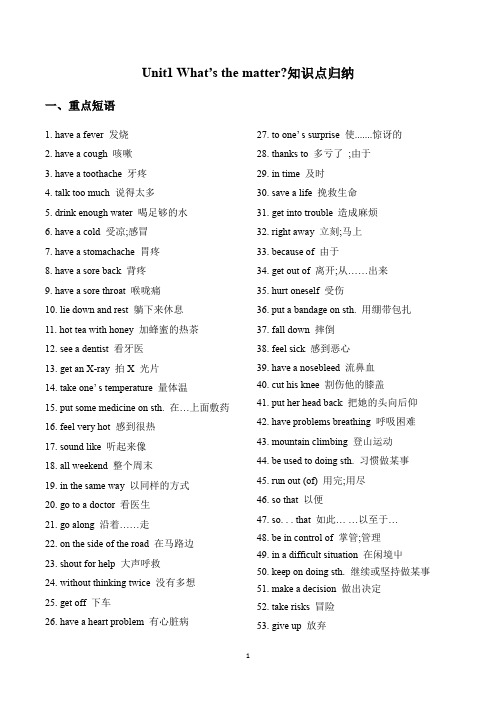
Unit1 What’s the matter?知识点归纳一、重点短语1. have a fever 发烧2. have a cough 咳嗽3. have a toothache 牙疼4. talk too much 说得太多5. drink enough water 喝足够的水6. have a cold 受凉;感冒7. have a stomachache 胃疼8. have a sore back 背疼9. have a sore throat 喉咙痛10. lie down and rest 躺下来休息11. hot tea with honey 加蜂蜜的热茶12. see a dentist 看牙医13. get an X-ray 拍X 光片14. take one’ s temperature 量体温15. put some medicine on sth. 在…上面敷药16. feel very hot 感到很热17. sound like 听起来像18. all weekend 整个周末19. in the same way 以同样的方式20. go to a doctor 看医生21. go along 沿着……走22. on the side of the road 在马路边23. shout for help 大声呼救24. without thinking twice 没有多想25. get off 下车26. have a heart problem 有心脏病27. to one’ s surprise 使.......惊讶的28. thanks to 多亏了;由于29. in time 及时30. save a life 挽救生命31. get into trouble 造成麻烦32. right away 立刻;马上33. because of 由于34. get out of 离开;从……出来35. hurt oneself 受伤36. put a bandage on sth. 用绷带包扎37. fall down 摔倒38. feel sick 感到恶心39. have a nosebleed 流鼻血40. cut his knee 割伤他的膝盖41. put her head back 把她的头向后仰42. have problems breathing 呼吸困难43. mountain climbing 登山运动44. be used to doing sth. 习惯做某事45. run out (of) 用完;用尽46. so that 以便47. so. . . that 如此… …以至于…48. be in control of 掌管;管理49. in a difficult situation 在闲境屮50. keep on doing sth. 继续或坚持做某事51. make a decision 做出决定52. take risks 冒险53. give up 放弃二、用法归纳1.need to do sth.需要去做某事2.see sb. doing sth.看见某人正在做某事3.ask sb. sth.询问某人某事4.expect sb. to do sth.期望某人做某事5.agree to do sth.同意做某事6.help sb. ( to ) do sth.帮助某人做某事7.want to do sth.想要做某事8.tell sb. To do sth.告诉某人做某事9.have problems (in) doing sth.做某事有困难e sth. To do sth. 用某物去做某事11.be/get used to doing sth.习惯于做某事12.seem to do sth.好像做某事13.keep on doing sth.继续做某事14.mind doing sth.介意做某事三、重点句型1. What’ s the matter? 你怎么了?What’ s the matter with you? = What’s the trouble with you? = What’ s wrong with you?2. What should she do? 她该怎么办呢?Should I take my temperature? 我应该量一下体温吗?主语+ should/shouldn’t + 动词原形. ..①You should lie down and rest.你应该躺下休息一会儿。
八年级下册英语unit1-unit10课文翻译

Unit1What’s the matter? 2dA丽萨,你好吗?B我头疼,并且脖子不能动。
我该怎么办?我应该量体温吗?A不,听起来不像是你发烧。
周末你做什么了?B我整个周末都在玩电脑游戏。
A那很可能就是原因,你需要离开电脑休息几次。
B是的,我想我是一个姿势做的太久没有移动。
A我认为你应该躺下休息。
如果明天你的头和脖子还痛的话,就去看医生。
B好的,谢谢,曼迪。
3a公交车司机和乘客救了一位老人昨天上午九点,26路公交车正行驶在中华路上,这时司机看到一位老人躺在路边。
在他旁边一位妇女在喊救命。
公交车司机,24岁的王平没有多想就停下来公交车。
他下了车,问那个妇女发生了什么事。
她说那个人有心脏病,应该去医院。
王先生知道他必须快点行动。
他告诉乘客他必须送老人去医院。
他希望大部分或全部乘客下车去等下一辆公交车。
但出乎他的意料,他们都同意和他一起去。
一些乘客帮助王先生把那个老人移到公交车上。
多亏了王先生和乘客们。
医生及时挽救了老人的生命。
“许多人因为不想有麻烦而不想帮助别人,这真令人难受”,一位乘客说。
“但是这位司机没有考虑自己。
他只考虑挽救一条生命。
”2b他失去了手臂但还在爬山阿伦是一个对爬山感兴趣的美国人。
作为一名登山者,阿伦习惯于冒险。
这是关于做危险运动的令人兴奋的事情之一。
"有许多次,阿伦因为(意外)事故几乎失去生命。
在2003年4月26日,在犹他州登山时他发现自己在非常危险的处境。
在那天,当阿伦独自登山时,他的手臂被压在落在他身上的一块360千克的岩石下。
因为他的手臂不能自由活动,他在那儿待了五天,希望有人会发现他。
但当他的水喝完了,他知道他将不得不采取措施来挽救的生命了。
他不愿意那天就死去。
因此他用刀子切除了他的一半右臂。
然后,他用左臂给自己打上绷带以至于他不会失去太多的血。
这之后,他爬下山区寻求帮助。
在他失去手臂后,他写了一本名为《生死抉择》(又译作《生死两难》)的书。
他的意思是“处于一个你似乎无法拜托的困境之中”。
八年级英语下册:Unit 1 Have you ever been to an amusement
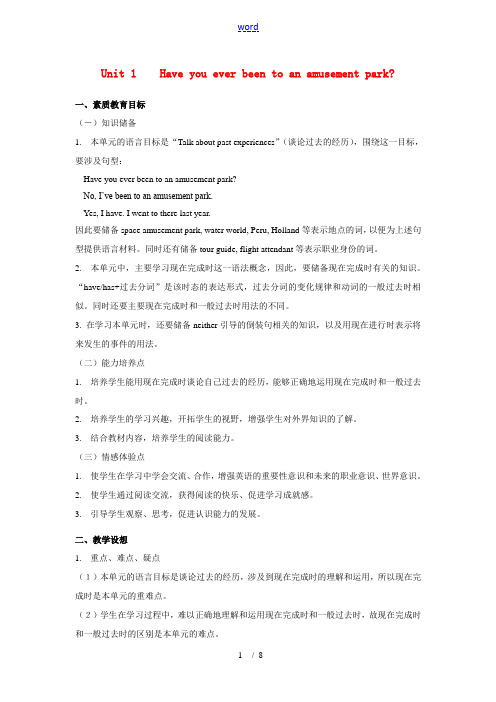
Unit 1 Have you ever been to an amusement park?一、素质教育目标(-)知识储备1.本单元的语言目标是“Talk about past experiences”(谈论过去的经历),围绕这一目标,要涉及句型:---Have you ever been to an amusement park?---No, I’ve been to an amusement park.---Yes, I have. I went to there last year.因此要储备space amusement park, water world, Peru, Holland等表示地点的词,以便为上述句型提供语言材料。
同时还有储备tour guide, flight attendant等表示职业身份的词。
2.本单元中,主要学习现在完成时这一语法概念,因此,要储备现在完成时有关的知识。
“have/has+过去分词”是该时态的表达形式,过去分词的变化规律和动词的一般过去时相似。
同时还要主要现在完成时和一般过去时用法的不同。
3. 在学习本单元时,还要储备neither引导的倒装句相关的知识,以及用现在进行时表示将来发生的事件的用法。
(二)能力培养点1.培养学生能用现在完成时谈论自己过去的经历,能够正确地运用现在完成时和一般过去时。
2.培养学生的学习兴趣,开拓学生的视野,增强学生对外界知识的了解。
3.结合教材内容,培养学生的阅读能力。
(三)情感体验点1.使学生在学习中学会交流、合作,增强英语的重要性意识和未来的职业意识、世界意识。
2.使学生通过阅读交流,获得阅读的快乐、促进学习成就感。
3.引导学生观察、思考,促进认识能力的发展。
二、教学设想1.重点、难点、疑点(1)本单元的语言目标是谈论过去的经历,涉及到现在完成时的理解和运用,所以现在完成时是本单元的重难点。
(2)学生在学习过程中,难以正确地理解和运用现在完成时和一般过去时,故现在完成时和一般过去时的区别是本单元的难点。
人教版(新目标)初中英语八年级下册Unit 1
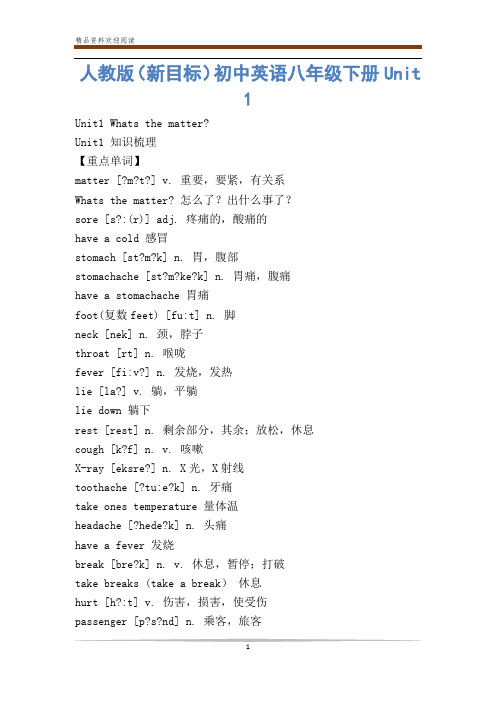
人教版(新目标)初中英语八年级下册Unit1Unit1 Whats the matter?Unit1 知识梳理【重点单词】matter [?m?t?] v. 重要,要紧,有关系Whats the matter? 怎么了?出什么事了?sore [s?:(r)] adj. 疼痛的,酸痛的have a cold 感冒stomach [st?m?k] n. 胃,腹部stomachache [st?m?ke?k] n. 胃痛,腹痛have a stomachache 胃痛foot(复数feet) [fu:t] n. 脚neck [nek] n. 颈,脖子throat [rt] n. 喉咙fever [fi:v?] n. 发烧,发热lie [la?] v. 躺,平躺lie down 躺下rest [rest] n. 剩余部分,其余;放松,休息cough [k?f] n. v. 咳嗽X-ray [eksre?] n. X光,X射线toothache [?tu:e?k] n. 牙痛take ones temperature 量体温headache [?hede?k] n. 头痛have a fever 发烧break [bre?k] n. v. 休息,暂停;打破take breaks (take a break)休息hurt [h?:t] v. 伤害,损害,使受伤passenger [p?s?nd] n. 乘客,旅客off [?f] adv. prep. 离开(某处);从去掉get off 下车to ones surprise 使惊讶,出乎意料onto [nt?] prep. 向,朝trouble [?tr?bl] n. 麻烦,烦扰,问题hit [hit] n. v. 碰撞,打,打击right away 立即,马上get into 陷入,参与herself [h?:?self] pron. 她自己,她本身(she的反身代词)bandage [b?nd?d?] n. v. 绷带;用绷带包扎sick [s?k] adj. 患病的,不适的knee [ni:] n. 膝盖nosebleed [?nzbli:d] n. 鼻出血breathe [bri:e] v. 呼吸sunburned [?s?nb?:nd] adj. 晒伤的ourselves [ɑ:?selvz] pron. 我们自己(we的反身代词)climber [?kla?m?(r)] n. 登山者be used to 习惯于适应于risk [r?sk] n. v. 风险,危险;冒险take risks (take a risk) 冒险accident [ksid?nt] n. 意外事件;事故situation [?sitju?ein] n. 状况,形式,情况kg=kilogram [?k?l?gr?m] n. 公斤,千克rock [r?k] n. 岩石run out (of) 用尽,耗尽knife [naif] n. 刀,餐刀cut off 切除blood [bl?d] n. 血mean [mi:n] v. 意味着,意思是,意欲get out of 离开,从出来importance [?m?p?:tns] n. 重要性decision [d?sn] n. 决心,决定,抉择control [k?ntrl] v. 控制,支配,操纵be in control of 掌管,管理spirit [sp?r?t] n. 勇气,意志death [de] n. 死亡give up 放弃nurse [n?:s] n. 护士【重点短语】1.have a fever 发烧2.have a cough 咳嗽3.have a toothache 牙疼4.talk too much 说得太多5.drink enough water 喝足够的水6.have a cold 受凉;感冒7.have a stomachache 胃疼8.have a sore back 背疼9.have a sore throat 喉咙痛10. take risks 冒险11.hot tea with honey 加蜂蜜的热茶12.see a dentist 看牙医13.get an X-ray 拍X 光片14.take one s temperature 量体温15.put some medicine on sth. 在上面敷药16. give up 放弃17. sound like 听起来像18. all weekend 整个周末19. in the same way 以同样的方式20. go to a doctor 看医生21. go along 沿着走22. on the side of the road 在马路边23. shout for help 大声呼救24. without thinking twice 没有多想25. get off 下车26. have a heart problem 有心脏病27. to one s surprise 另某人惊讶的是28. thanks to 多亏了;由于29. in time 及时30. make a decision 做出决定31. get into trouble 造成麻烦32. right away 立刻;马上33. because of 由于34. get out of 离开;从出来35. keep on doing sth. 继续或坚持做某事36. put a bandage on sth. 用绷带包扎37. fall down 摔倒38. feel sick 感到恶心39. have a nosebleed 流鼻血40. cut his knee 割伤他的膝盖41. put her head back 把她的头向后仰42. have problems breathing 呼吸困难43. mountain climbing 登山运动44. be used to doing sth. 习惯做某事45. run out (of) 用完;用尽46. so that 以便47. so...that... 如此以至于...48. be in control of 掌管;管理49. in a difficult situation 在闲境中【重点句型】1. Whats the matter with you?= Whatthe trouble with you?= Whats wrong with you? 你怎么了?2. What should she do? 她该怎么办呢?3.Should I take my temperature? 我应该量一下体温吗?4.You should lie down and rest. 你应该躺下休息一会儿。
八年级英语(下册)Unit1 What’s the matter单元语言点讲解和训练

一.短语归纳1.too much 太多2.lie down 躺下3.get an X-ray 做个X光检查4.take one ’s temperature 量体温5.put some medicine on ......在....上敷药5.have a fever 发烧7.take breaks /take a break 休息8.without thinking twice 没多想9.get off 下车9.take sb to the hospital 送某人去医院11.wait for等待12.to one’s surprise 使.......惊讶的13.thanks to多亏于;由于14. in time及时15.think about 考虑16.have a heart problem患有心脏病17.get into the trouble 遇到麻烦18.do the right thing做正确的事情事情19.fall down 摔倒20.put ...... on sth把...放在某物上21.get hit/sunburned 摔伤/烧伤22.be interested in 对.....感兴趣23.be used to 习惯于....24.take risks/take a risk 挑战25.lose one’s life 失去生命26.because of 因为27.run out of 用完28.cut off 切除29.get out of 从...出来30.make a decision/decisions 做决定31.be in control of 掌管;管理32.give up 放弃㈡用法归纳:1.need to do sth .需要去做某事2.see sb doing sth 看见某人正在做某事3.ask sb sth 询问某人某事4.expect sb to do sth 期望某人做某事5.agree to do sth 同意做某事6.help sb (to) do sth 帮助某人做某事7.want to do sth 想要做某事 8.tell sb to do sth 告诉某人做某事9.have problems(in) doing sth 做某事有困难 e sth to do sth用某物去做某事11.be/get used to doing sth 习惯于做某事12.seem to do sth 好像做某事13.keep on doing sth 继续做某事14.mind doing sth 介意做某事㈢语法点:1.询问某人的健康问题及遇到麻烦的表达方法。
人教版英语八年级下册unit1单元知识点归纳总结
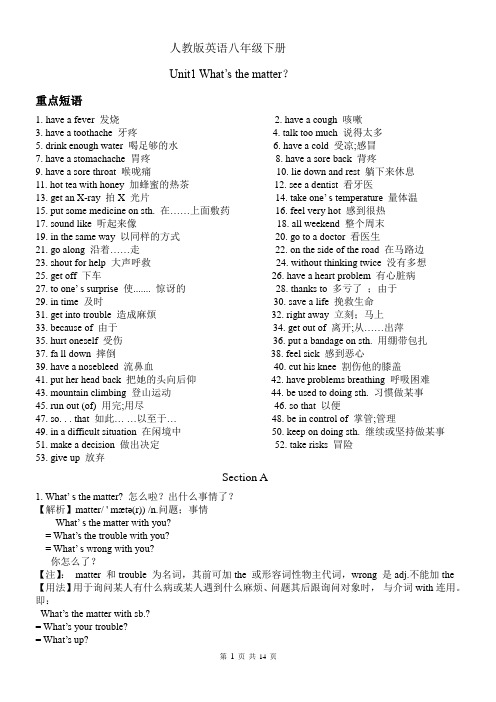
人教版英语八年级下册Unit1 What’s the matter?重点短语1.have a fever 发烧2. have a cough 咳嗽3. have a toothache 牙疼4. talk too much 说得太多5. drink enough water 喝足够的水6. have a cold 受凉;感冒7. have a stomachache 胃疼8. have a sore back 背疼9. have a sore throat 喉咙痛10. lie down and rest 躺下来休息11. hot tea with honey 加蜂蜜的热茶12. see a dentist 看牙医13. get an X-ray 拍X 光片14. take one’ s temperature 量体温15. put some medicine on sth. 在……上面敷药16. feel very hot 感到很热17. sound like 听起来像18. all weekend 整个周末19. in the same way 以同样的方式20. go to a doctor 看医生21. go along 沿着……走22. on the side of the road 在马路边23. shout for help 大声呼救24. without thinking twice 没有多想25. get off 下车26. have a heart problem 有心脏病27. to one’ s surprise 使....... 惊讶的28. thanks to 多亏了;由于29. in time 及时30. save a life 挽救生命31. get into trouble 造成麻烦32. right away 立刻;马上33. because of 由于34. get out of 离开;从……出萍35. hurt oneself 受伤36. put a bandage on sth. 用绷带包扎37. fa ll down 摔倒38. feel sick 感到恶心39. have a nosebleed 流鼻血40. cut his knee 割伤他的膝盖41. put her head back 把她的头向后仰42. have problems breathing 呼吸困难43. mountain climbing 登山运动44. be used to doing sth. 习惯做某事45. run out (of) 用完;用尽46. so that 以便47. so. . . that 如此… …以至于…48. be in control of 掌管;管理49. in a difficult situation 在闲境中50. keep on doing sth. 继续或坚持做某事51. make a decision 做出决定52. take risks 冒险53. give up 放弃Section A1. What’ s the matter? 怎么啦?出什么事情了?【解析】matter/ ' mætə(r)) /n.问题;事情What’ s the matter with you?= What’s the trouble with you?= What’ s wrong with you?你怎么了?【注】:matter 和trouble 为名词,其前可加the 或形容词性物主代词,wrong 是adj.不能加the 【用法】用于询问某人有什么病或某人遇到什么麻烦、问题其后跟询问对象时,与介词with连用。
初中英语八年级下册Unit 1(含答案解析)

一、选择题1.You should ______ more water when you have a fever.A.drinks B.drinking C.drink D.has C解析:C【解析】句意:你发烧时应该多喝水。
情态动词should后跟动词原形,故答案为C。
2.I couldn't believe that such an expensive car was________and crashed into another car. A.without controlling B.out of control C.under the control B解析:B【解析】句意:我真不敢相信这样一辆昂贵的汽车失控了,撞上了另一辆车。
考查介词短语辨析题。
A. without controlling没有控制;B. out of control失去控制;C. under the control在控制下。
根据句意结构,可知out of control最合语境,故选B。
3.What’s the matter ____ you?—My back hurts.A.with B.for C.at D.on A解析:A【解析】句意:你怎么了?-我背痛。
A. with对于,和,具有;B. for为了,给; C. at 在;D. on在…上,关于,接通。
句型What’s the matter?:什么事,怎么了,问某人怎么了,出了什么事,用with sb.;故选A。
4.You should ____ more water when you have a fever.A.drinks B.drinking C.drinked D.have D解析:D【解析】句意:你发烧的时候应该多喝水。
Should:应该,情态动词,后面跟动词原形;故选D。
5.He’s ill. He must go to ____ a doctor in the hospital.A.look B.watch C.see D.visited C解析:C【解析】句意:他病了。
八年级英语下册 Unit1 核心词汇

八年级英语下册Unit1核心词汇教材核心词汇知识链接及典例解读一、used to曾经教材原句You used to share food with me!你过去常与我分享食物!背例句学搭配His parents used to live in the countryside.他的父母过去住在乡下。
固定搭配used to do sth. 意为“过去经常做某事,以前常常做某事”,表示过去的习惯。
本身已是过去时态,没有人称和数的变化,暗含现在已不再如此。
易混辨析be used to doing sth.习惯于做某事My father is used to reading newspapers after dinner.我父亲习惯晚饭后读报。
be used to do 被用来做……A pen is used to write with.笔是用来写的。
典例解读1.My father _____________in a small village when he was a small child.A.used to living B.was used to liveC.used to live D.use to live【答案】C【解析】句意:我父亲小时候住在一个小村庄。
be used to doing sth.习惯于做某事,used to do sth.过去常常做某事,固定搭配。
根据时间状语从句when he was a small child可知,此处是“我父亲过去常常住在一个小村庄。
故选C。
2.My father _______ working on the farm, but he is a driver now.A.is used to B.was used to C.used to D.gets used to【答案】B【解析】句意:我父亲过去在农场工作,但他现在是一名司机。
根据but he is a driver now 可知,前面应该是表示过去发生的事情,排除A和D;be used to doing sth.习惯于做某事,used to do sth.过去常常做某事,固定搭配。
Unit1what’sthematter_SectionA知识点梳理人教版八年级英语下册

人教版八年级下册英语课本知识点梳理Unit 1 wh at’s the matter? sectionA课文内容:What's the matter? 怎么了? (教材第1页)【用法详解】What's the matter? 怎么了?/出什么事了?常用于询问某人患了何种疾病,遇到了什么困难等,也可用于询问某物出了什么故障,其后可接with sb./sth.,表示“某人/某物怎么了?”。
其中matter 用作名词,意为“问题;事情”matter前须加定冠词the。
【例句】What's the matter? 怎么了?Bad luck.I lost my pen. 真倒霉,我弄丢了钢笔.What's the matter with him? 他怎么了?He has a sore back.他背痛【拓展】matter[动词] 要紧;有关系多用在否定句、疑问句或条件句中It doesn't matter.没关系。
(通常用来回答对方的道歉)I have a cold. 我感冒了。
(教材第1页)【用法详解】have a cold (患)感冒。
其中have 用作及物动词,意为“患(病);遭受(病痛)”,常用于结构“have a/an +疾病名称”表示患病或身体某部位不舒服。
此时它不能用于进行时态,其第三人称单数形式为has,过去式为had。
常见的表示病痛的短语还有:have a fever 发烧have a toothache 牙疼have a headache头痛have a cough 咳嗽have a stomachache胃痛Do you often have a cold? 你经常感冒吗?Jim had a stomachache after supper yesterday.吉姆昨天晚饭后胃痛。
l have a stomachache.我胃痛。
( 教材第1 页)【用法详解】stomachache [名词]胃痛;腹痛是由“名词stomach(;腹部)+ache(疼痛)”构成的复合名词。
人教版英语八年级下unit1讲解与练习
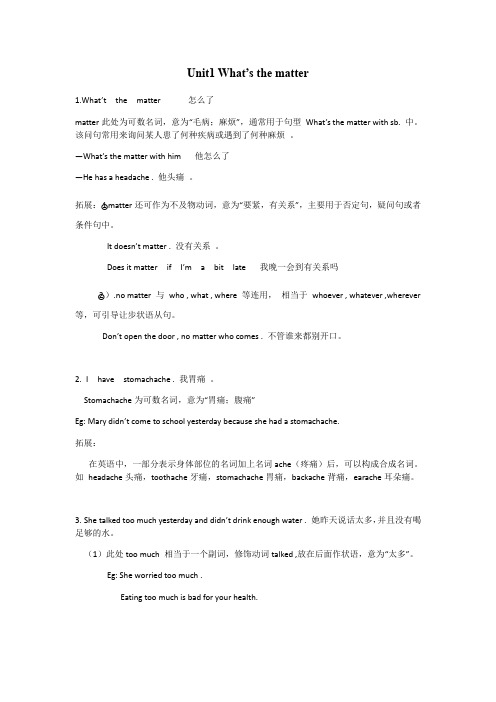
Unit1 What’s the matter1.What’t the matter 怎么了matter此处为可数名词,意为“毛病;麻烦”,通常用于句型What’s the matter with sb. 中。
该问句常用来询问某人患了何种疾病或遇到了何种麻烦。
—What’s the matter with him 他怎么了—He has a headache . 他头痛。
拓展:○1matter还可作为不及物动词,意为“要紧,有关系”,主要用于否定句,疑问句或者条件句中。
It doesn’t matter . 没有关系。
Does it matter if I’m a bit late 我晚一会到有关系吗○2).no matter 与who , what , where 等连用,相当于whoever , whatever ,wherever 等,可引导让步状语从句。
Don’t open the door , no matter who co mes . 不管谁来都别开口。
2. I have stomachache . 我胃痛。
Stomachache为可数名词,意为“胃痛;腹痛”Eg: Mary didn’t come to school yesterday because she had a stomachache.拓展:在英语中,一部分表示身体部位的名词加上名词ache(疼痛)后,可以构成合成名词。
如headache头痛,toothache牙痛,stomachache胃痛,backache背痛,earache耳朵痛。
3.She talked too much yesterday and didn’t drink enough water . 她昨天说话太多,并且没有喝足够的水。
(1)此处too much 相当于一个副词,修饰动词talked ,放在后面作状语,意为“太多”。
Eg: She worried too much .Eating too much is bad for your health.(2)此处enough为形容词,意为“足够的”。
(完整版)Unit1人教版八年级英语下册语法与知识点,推荐文档

Unit 1第一部分:Grammar一、情态动词(Modal Verbs)情态动词should 意为“应该,应当”,必须和后面的动词原形一起构成谓语,没有人称和数的变化。
用以表达职责和义务、提出劝告,而且表述的是自己的主观看法。
注意:should 在以why,who,how 等疑问词开头的问句中,意为“竟然,居然,怎么会”,表示意外、惊喜或在说话人看来是不可思议的。
三、反身代词表示反射或强调的代词叫做反身代词。
反身代词是由第一人称、第二人称形容词性物主代词或第三人称代词的宾格形式,词尾加self 或selves 组成。
反身代词可译“本人”、“本身”,为加强语气,也常翻译为“亲自”、“自己”。
不定人称代词one ---- o neself.第二部分:单词用法Section A1.What’s the matter?怎么了?该句常用询问某人患了何种疾病或遇到了什么麻烦,其后用with 引出对象。
1). What’s the matter with sb.?=what’s wrong with sb.?=what’s the trouble/problem with sb.?=what’s one’s trouble/problem?e.g. What’s the matter w ith Tom?=what’s with Tom?=What’s the with Tom?=What’s Tom’s?2). matter, 名词,“问题,事情”e.g. We have important (matter) to discuss.我们有些重要的问题要讨论。
3). 动词,“要紧,关系重大”e.g. It dosen’t that you came late.2.I have a cold. 我感冒了。
1).have/get/catch a cold “感冒,着凉”The old man a cold yesterday.那位老人昨天感冒了。
人教版英语八年级下册Unit1 知识点精讲
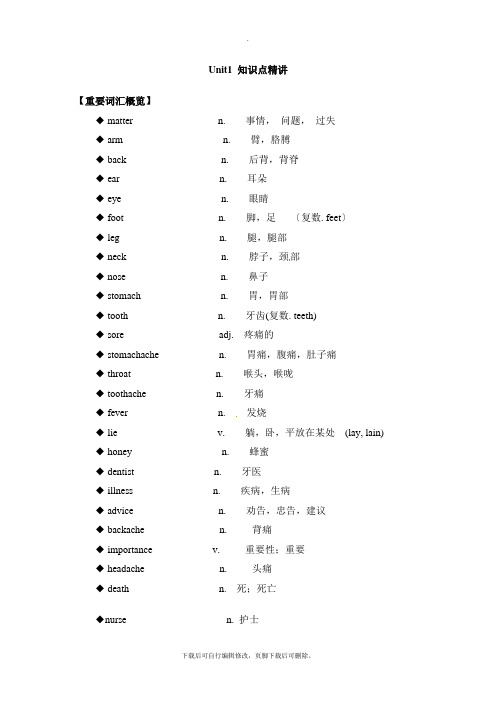
Unit1 知识点精讲【重要词汇概览】◆ matter n.事情,问题,过失◆ arm n.臂,胳膊◆ back n.后背,背脊◆ ear n.耳朵◆ eye n.眼睛◆ foot n.脚,足〔复数. feet〕◆ leg n.腿,腿部◆ neck n.脖子,颈部◆ nose n.鼻子◆ stomach n.胃,胃部◆ tooth n.牙齿(复数. teeth)◆ sore adj.疼痛的◆ stomachache n.胃痛,腹痛,肚子痛◆ throat n.喉头,喉咙◆ toothache n.牙痛◆ fever n.发烧◆ lie v.躺,卧,平放在某处(lay, lain)◆ honey n.蜂蜜◆ dentist n.牙医◆ illness n.疾病,生病◆ advice n.劝告,忠告,建议◆ backache n.背痛◆ importance v. 重要性;重要◆ headache n. 头痛◆ death n. 死;死亡◆nurse n. 护士◆ knife n. (复数.knives)刀【重要词组概览】◆ have a cold患感冒◆ take breaks(take a break) 休息◆ lie down 躺下◆ get off 下车◆ be used to 习惯于...;适应于...◆ on the other hand另一方面◆ get a cold患感冒◆ see a dentist看牙医◆take one’s temperature 量体温◆ make sb sick使某人不舒服(患锁病)◆ have a sore throat嗓子痛◆ have a fever发烧,发热◆ have a toothache牙痛◆ have a backache背痛◆ have a headache头痛◆give up 放弃◆cut off 切除◆get out 〔of〕用尽;耗尽◆take risks〔take a risk〕冒险◆get into 陷入;参与◆right away 立即;马上◆to one’s s urprise 使...惊讶的;出乎...意料【语法知识聚焦】看病需要和医生交流,这是英语口语中必不可少的内容。
人教版八年级英语下册 Unit1 知识点讲解
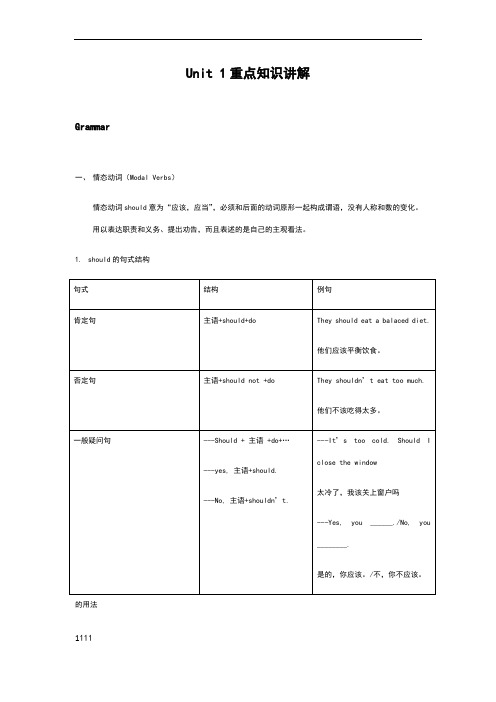
Unit 1重点知识讲解Grammar一、情态动词(Modal Verbs)情态动词should意为“应该,应当”,必须和后面的动词原形一起构成谓语,没有人称和数的变化。
用以表达职责和义务、提出劝告,而且表述的是自己的主观看法。
1.should的句式结构的用法注意:should在以why,who,how等疑问词开头的问句中,意为“竟然,居然,怎么会”,表示意外、惊喜或在说话人看来是不可思议的。
二、其他表示建议的句型三、反身代词表示反射或强调的代词叫做反身代词。
反身代词是由第一人称、第二人称形容词性物主代词或第三人称代词的宾格形式,词尾加self或selves组成。
反身代词可译“本人”、“本身”,为加强语气,也常翻译为“亲自”、“自己”。
不定人称代词one-----oneself.1、反身代词的分类2、反身代词的用法单词的用法Section A1.What’s the matter怎么了该句常用询问某人患了何种疾病或遇到了什么麻烦,其后用with引出对象。
1). What’s the matter with sb.=what’s wrong with sb.=what’s the trouble/problem with sb.=what’s one’s trouble/problem. What’s the matter with Tom=what’s _________ with Tom=What’s the _________ with Tom=What’s Tom’s _________2). matter, 名词,“问题,事情”. We have important _________(matter) to discuss.我们有些重要的问题要讨论。
3). 动词,“要紧,关系重大”. It dosen’t _________ that you came late.2.I have a cold.我感冒了。
Unit1教案及练习--八年级英语下册

八年级下unit1教案及练习Unit 1 Helping those in need知识清单一、词形转换1. disabled adj.残疾的disability n.残疾2. organize v.组织organization n.组织3. express v.表达;表露expression n.表达;表情expressive adj.富于表情的4. serious adj.严重的seriously adv.严重地5. ill adj.有病的illness n.疾病6. permit v.允许permission n.准许;批准7. pain n.痛苦;苦恼painful adj.痛苦的painless adj.无痛的8. joy n.愉快;喜悦joyful adj.愉快的9. peace n.平静;宁静peaceful adj.和平的;安静的peacefully adv.和平地;安静地10. courage n.勇气;勇敢encourage v.鼓励11. voluntary adj.义务的volunteer n.志愿者12. alone adj.独自的;单独的adv.独自地1. ask permission to do sth.报请批准做某事2. raise money for 为...筹钱3. give sb. a hand给某人帮个忙4. offer to do sth.主动提出做某事5. in a children's hospital在一家儿童医院6. suffer from因...受苦;受折磨7. serious illnesses严重疾病10. spend time with sb.与某人共度时光11. bring joy and peace带来快乐与平静12. raise one's spirits使振奋;使鼓起勇气13. feel lonely感到孤独14. a person with courage一个有勇气的人15. return to sp.回到某地16.attend classes上课8. a painting competition .一次绘画比赛9. tell stories讲故事17. in order to / so as to为了....18. do some voluntary work 做一些志愿者工作1. Three teenagers offer to do some voluntary work during the school holidays.三名青少年主动提出在学校假期期间去做义工。
(完整版)人教版八年级英语下册Unit1知识点讲解(可编辑修改word版)

Unit 1 重点知识讲解Grammar一、情态动词(Modal Verbs)情态动词should 意为“应该,应当”,必须和后面的动词原形一起构成谓语,没有人称和数的变化。
用以表达职责和义务、提出劝告,而且表述的是自己的主观看法。
1.should 的句式结构2.s hould 的用法喜或在说话人看来是不可思议的。
二、其他表示建议的句型表示反射或强调的代词叫做反身代词。
反身代词是由第一人称、第二人称形容词性物主代词或第三人称代词的宾格形式,词尾加self 或selves 组成。
反身代词可译“本人”、“本身”,为加强语气,也常翻译为“亲自”、“自己”。
不定人称代词one ---- oneself.1、反身代词的分类2、反身代词的用法单词的用法Section A1.What’s the matter?怎么了?该句常用询问某人患了何种疾病或遇到了什么麻烦,其后用with 引出对象。
1). What’s the matter with sb.?=what’s wrong with sb.?=what’s the trouble/problem with sb.?=what’s one’s trouble/problem?e.g. What’s the matter with Tom?=what’s with Tom?=What’s the with Tom?=What’s Tom’s?2). matter, 名词,“问题,事情”e.g. We have important (matter) to discuss.我们有些重要的问题要讨论。
3). 动词,“要紧,关系重大”e.g. It dosen’t that you came late.2.I have a cold.我感冒了。
1).have/get/catch a cold “感冒,着凉”The old man a cold yesterday.那位老人昨天感冒了。
新人教版八年级下册英语Unit1-单词.ppt

51.knife 52.cut off 53.blood 54.mean 55.get out of 56.importance 57.decision 58.control 59.be in control of 60.spirit
Unit 1 单词及短语
61.死亡
61. death
62.放弃
62. give up
31.立即,马上
31.right away
32.陷入,参与
32.get into
33.她自己,她本身 33.herself
34.her的反身代词
34.herself
35.绷带;用绷带包扎 35.bandage
36.患病的,不适的 37.膝盖 38.鼻出血 39.呼吸 40.晒伤的
36.sick 37.knee 38.nosebleed 39.breathe 40.sunburned
7. foot (feet)
8.颈,脖子
8. neck
9.胃,腹部
9. stomach
10.喉咙
10.throat
Unit 1 单词及短语
11. 发烧,发热
11.fever
12.躺,平躺
12.lie
13.躺下
13.lie down
14.其余;放松,休息 14.rest
15.咳嗽
15.cough
16.光,射线
23.伤害,使受伤 23.hurt
24.乘客,旅客
24.passenger
25.离开;从…去掉 25.off
26.下车
26.get off
27.使…惊讶的是 27.to one’s surprise
28.向,朝
28.onto
英语八年级下册-Unit1课件(含答案)
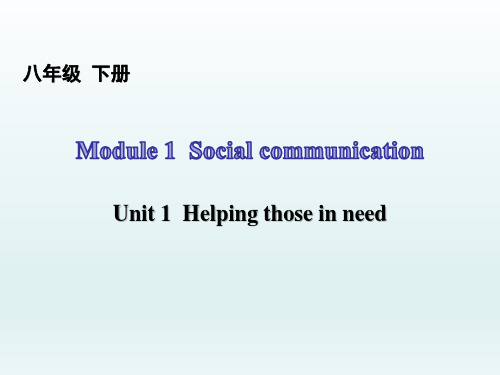
To _5__, many students looked for part-time jobs and saw how hard life was. Some made use of their talents __6__ singing and dancing in parks or shopping malls.
四、完形填空 If you are given only 1 yuan, can you live in a city for
one day? It may be a little difficult. But the ___1___ from Xi’an did it.
On 10 April, more than 60 students from a middle school ___2___ the One Yuan Metropolis(大都市) Survival. The charity for teenagers called Imperceptible (无法察觉的) Education held this ___3___. Students not only had to live,but they also had to deal with a lot of ___4___ tasks.
( B )5. —We will succeed if we continue studying hard.
—Yes. I agree with you.
A. start
B. go on
C. stop
( C )6. —Did your parents pay the money for your new
—Yes. I agree with you.
八年级英语下册Unit1 知识梳理(重要句型、重点单词、短语解析及练习)

八年级英语下册Unit1 知识梳理(重要句型、重点单词、短语解析及练习)课文翻译:Section A 会话Role-play the conversation. 角色扮演对话。
Lisa, are you OK? 丽莎,你还好吗?I have a headache and I can't move my neck. 我头痛,我的脖子不能动了。
What should I do? 我头痛,我的脖子不能动了。
Should I take my temperature? 我应该测测体温吗?No, it doesn't sound like you have a fever. 不,你看起来不像是发烧了。
What did you do on the weekend? 你周末做什么了?I played computer games all weekend. 我整个周末都在玩电脑游戏。
That's probably why. 这可能就是你头痛的原因了。
You need to take breaks away from the computer. 你需要休息并且远离电脑。
Yeah, I think I sat in the same way for too long without moving. 是的,我想我是因为以同样的姿势坐的太久没有动。
I think you should lie down and rest. 我想你应该躺下休息。
If your head and neck still hurt tomorrow, then go to a doctor. 如果明天你的头部和颈部还疼,再去看医生。
OK. Thanks, Mandy. 好。
谢谢你,曼蒂。
Section A 短文Read the passage. 阅读下面的短文。
Do you think it comes from a newspaper or a book? 你认为这篇短文是出自一份报纸还是一本书?How do you know? 你是怎么知道的?Bus Driver and Passengers Save an Old Man 公交车司机和乘客救了一位老人At 9:00 a.m. yesterday, bus No. 26 was going along Zhonghua Road when the driver saw an old man lying on the side of the road. 在昨天上午9点,当司机看到一位老人躺在路边,26路公交车正在沿中华路行驶。
Unit1单词整理初中英语人教版八年级下册

Army officers said thesituationwas under control.
Thesituationwas moreplicatedthan they had at first realized.
I have gottoothache, so I must go to a dentist.
headache头疼
Red wine gives me aheadache.
The realheadachewill be getting the bank to lend you the money.头疼的事
I think I'vebrokenthe washing machine.
break the law/rules/conditions/an agreement/a contract/a promise/your word
Shebroke the silenceby coughing.break my train of thought打断思路
neck颈;脖子
He tied a scarf around hisneck./ Giraffes have very longnecks.
She wore a heavy goldchainaround her neck.
All of a sudden someone grabbed me around theneck.
A helicopter wasscrambledto help rescue three youngclimbers.
Theclimbersface certain death if therescuetoday is unsuccessful.
- 1、下载文档前请自行甄别文档内容的完整性,平台不提供额外的编辑、内容补充、找答案等附加服务。
- 2、"仅部分预览"的文档,不可在线预览部分如存在完整性等问题,可反馈申请退款(可完整预览的文档不适用该条件!)。
- 3、如文档侵犯您的权益,请联系客服反馈,我们会尽快为您处理(人工客服工作时间:9:00-18:30)。
甚至
运用拓展
请根据本节所学内容出一两道练 习题考一考你的同学,形式不限
1. He began to learn playing chess last week. and he _____it D at once. A. fall love in B. fell love in C. felt love in with D. fell in love with 2. The old man lives _____ B but he never feels _____. A.lonely ;alone B. alone ;lonely C.alone;alone D.lonely ;lonely 3. My mother _____ A me when I was young every day. A.dressed B.put on C .wear D. wore 4. I __________ swim when I was five. C A.can B.is able to C.was able to D. be able to 5. Jim usually goes ______ D during the winter holiday. A. skate B. skates C.skated D.skating
3.What kind of building will she live with her best friends? Why?
She’ll live in an apartment with her best friends because she doesn’t like living alone. 4.What pets will she keep? She’ll keep a pet parrot.
要求: 1、小组长认真负责,确保人人 参与。 2、激情投入,体验合作学习的 快乐。 3、时间5分钟。
1.What job will Ming to be?
She will be a reporter.
2.What city will she live in? Why?
She’ll live in Shanghai.Because she went to Shanghai and fell in love with it last year.
new words
fall alone pet parrot probably 落下;跌落 孤独地;能够, 有能力的
be able to 能够„„; 得以
宠物 dress
鹦鹉 可能,也许 casually which even 穿衣
非正式的; 随意的
哪个; 哪几个
go skating 去滑冰
Step1:预习检测
二、翻译以下短语 1. 爱上(某人或某物) fall in love with 2.养一个宠物鹦鹉 keep a pet parrot
3.有能力做某事 be able to do sth
Step2:情景导入
What does she do? She is an astronaut.
展示点评分工表
展示内容 展示形式 展示小组 评价小组
The key phrases
板演
G3
G1
The important sentences
板演
G5
G4
The important phrases:
1.fall in love with
3 live alone
2 live in an apartment
4 keep a pet parrot
5 go skating
The important sentences:
1.In ten years I think I’ll be a reporter. 2 I’ll be able to dress more casually.
Task3: Describe Ming’s life in ten years
Ming in ten years
Job Reporter
Pets
Sports Places Clothes
Parrot
Go skating and swimming Hong Kong, Australia Wear a suit during the week and dress more casually on weekends
2. Because I don’t like living alone. alone 可作形容词和副词, 意思是“单独;独自”, 不指心理上寂寞的感觉。 lonely用作形容词, 意思是“孤单的;寂寞的”。可指 心灵上的寂寞, 也可指偏僻的地点。在句中既可作 表语, 也可作定语。 例: feel lonely(√);a lonely traveller(√) be alone(√);a alone house(×) e.g. I live alone, but I don’t feel lonely! She lived in a lonely island, but she never felt lonely.
2 live in an apartment
4 keep a pet parrot
5 go skating
The important sentences:
1.In ten years I think I’ll be a reporter. 2 I’ll be able to dress more casually.
This bird is my
pet. 宠物
parrot
go skating
dress sb/oneself
I’ll be able to dress more casually. can / be able to 相同点: 两者都表示能力 不同点: 1) can只有现在式和过去式,无人称变化。 2) be able to有人称,时态变化(常用于除进行时 以外的任意时态)。 试做以下试题: can/is able to 1.He ________________drive a car. able to/could 2.He was _______________climb the mountain two years ago. 3.He will ____________go skating in two years. be able to
fell---(fall 的过去式)落下;变为
fall in love with sb / sth.喜爱、爱上某 人或某物 1.He met the girl in a bar and fell in love with her last year.
st year, I visited the art exhibition and fell in love with the work of Xu Beihong.
Write a passage about your
life in ten years.Then you’ll report it to us in class
tomorrow.
我总结我评价
• 请科代表同学对本节课进行小结和 点评
质疑 之星
评价 之星
优秀 小组
I will become an astronaut in ten years. What about you?
Step3:设疑自探
Turn to Page 6. Listen to the tape and read the text by yourself .Find out the answers to these questions
5.What sports will she play?
6.What clothes will she wear?
She’ll probably go skating and swimming.
During the week she’ll wear a suit .On the weekend she’ll be able to dress more casually.
Please read the text again and try to find out (Task1)the key phrases(关键短语) (Task2)the important sentences (重要句子) then discuss how to use them in groups.
Unit 1 Will people have robots?
Step1:预习检测
一、根据句意填词 apartment (公寓) 1.I want to live in an_____________. pet 2.She has a ____________________. (宠物)
go skating (去滑冰) 3.Let’s_________________.
展示点评分工表
展示内容 展示形式 展示小组 评价小组
Describe Ming’s life in ten years
口述
G2
G6
Do you have any other questions?
The important phrases:
1.fall in love with
3 live alone
